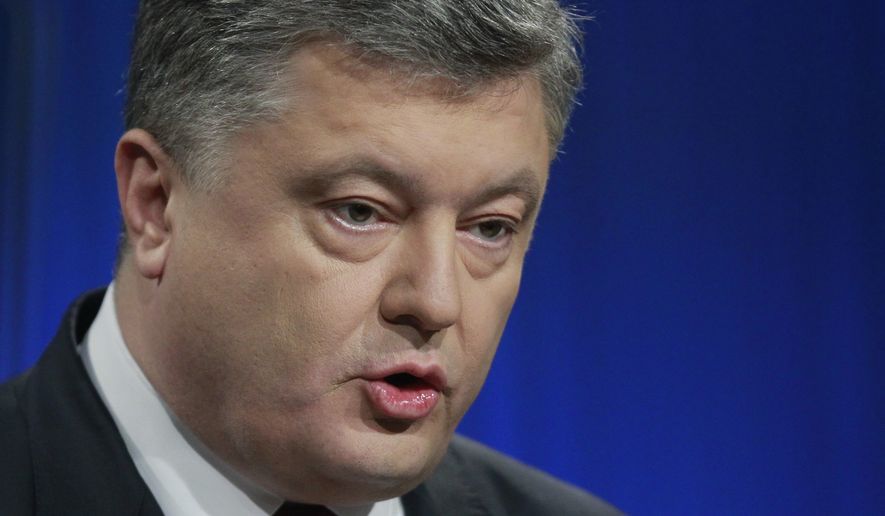ANALYSIS/OPINION:
Corruption in Ukraine is the cancer that is slowly eating away at the rotting flesh of its dying democracy.
In spite of the Orange Revolution of 2004 and the Maidan Revolution a decade later, when hundreds died and thousands more were wounded trying to change the political system, the oligarchs still pull the strings of power in Kiev. Unwilling to give up their power and influence in government, accustomed to maintaining and even increasing their vast wealth, these robber barons have almost squelched any chance of a new future for Ukraine’s children.
While the Ukrainian youths fought and died for a new life against Moscow-backed ex-President Viktor Yanukovych and his paramilitary forces in 2014, the oligarchs maintained their chokehold on a corrupt parliament and the electoral process, killing the dreams of a brighter future for the country.
A perfect example of this situation is a bill recently passed by the parliament, now awaiting the signature of President Petro Poroshenko. The measure, which waters down corruption laws, passed with great fanfare and political cost. It effectively removes any possibility of legal prosecution of corrupt government officials. Many analysts have suggested that the bill would not have made it through parliament without the president’s covert support.
Should the bill become law, the elites in Ukraine will have successfully thwarted the anti-corruption efforts mandated by the West and specifically by the International Monetary Fund, putting at risk the vitally needed bailout package being implemented by the IMF. IMF chief Christine Lagarde recently said she did not see how the bailout package could be sustained in the current environment.
The resignation last month of Economic Minister Aivarus Abromavicius, a Lithuanian technocrat brought in by Mr. Poroshenko to root out corruption, is another sign that the oligarchs are firmly in control in Kiev. Mr. Poroshenko has urged his minister to stay, and the situation remains in front of lawmakers, who have yet to approve the resignation.
Parliament and the electoral process seem to be at the root of the oligarchs’ continued dominance. The crooked election system, controlled at the local level by powerful business figures in control of vast sums of money to buy votes and bribe officials, continually places corrupt members of parliament in a position to stifle reform. In addition to controlling appointments to key government and state-owned corporate positions, parliament holds a tight leash on NABU, the anti-corruption bureau, frustrating its efforts.
I spoke recently with aides to NABU director Artem Sytnyk who argued that the organization has made great progress, putting together a unit of young, idealistic professionals ready to tackle Ukraine’s deep-seated corruption. The organization has hired and trained scores of investigators in a lengthy vetting process to construct a seemingly powerful force fighting for Ukraine’s future as a free and law-abiding country.
But Mr. Sytnyk’s office relies on several key components to complete its mission, components that are wholly out of its control. For instance, NABU must work with Ukrainian security services and national police to access the wiretapping capability so crucial to an effective corruption investigation. Who can authorize such access? Why, the Ukrainian parliament of course!
In addition, NABU must rely on the legislature for the financial resources to carry out its mandate, as well as for the money to implement a whistleblower program, the electronic financial declaration program, immunity for witnesses and other investigative tools. It is easy to see how the legislature could subtly prevent NABU from doing its job.
In addition, NABU must rely on Prosecutor General Viktor Shokin and his office to pursue the cases it does uncover, an organization routinely accused of overlooking and even fostering corruption in government. Just recently, U.S. diplomats have accused Mr. Shokin of stonewalling the work of NABU in its fight against high-level corruption.
Russia, of course, is only too happy to let Ukraine slide into the abyss of corruption and become a failed state. All President Vladimir Putin, a fierce critic of the Maidan Revolution, has to do is maintain the pressure in Ukraine’s restive eastern regions, and Kiev, it seems, will do the rest for him. The big question is, how long will ordinary Ukrainians put up with this stagnation? Although at the moment there seems to be little appetite for another revolution, public sentiment can change quickly into something altogether different.
• L. Todd Wood, a former U.S. military helicopter pilot and Wall Street debt trader, is a contributor to Fox Business, the National Review and many other publications. He can be reached through his website, LToddWood.com.
• L. Todd Wood can be reached at ltwood@123washingtontimes.com.




Please read our comment policy before commenting.